Immutable State
Using immutable objects whenever possible results in robust implementations. Function calls and state changes become predictable. Using value objects instead of raw data structures like arrays or plain strings adds type safety, acts as documentation and makes code much more readable. All very important properties for long-lived applications that are constantly reshaped.
The EventEngine\Data package provides useful helpers to speed up development of immutable objects. In fact, when using the Prototyping or Functional Flavour all application state should be immutable.
For the OOP Flavour the only exception are Aggregate Roots. But even then it's recommended to use a single internal state property within the AR that references immutable state and is the only mutable part of the object.
PHPStorm Templates
Writing immutable value objects in PHP is painful because you need a lot of boilerplate code and always have the risk to introduce bugs due to typos.
Libraries like FPP aim to simplify the task of writing immutable objects and combine them to complex structures.
FPP works quite well and you can use it together with Event Engine.
However, if you don't want to learn another meta language but still want to avoid writing all the boilerplate that comes along with immutable objects,
EventEngine\Data combined with PHPStorm Live Templates might be for you.
Keep in mind that both FPP and EventEngine\Data are only suggestions. You don't have to use them. It's also fine if you prefer working with a serializer library.
The EventEngine\Data package contains a set of live templates specifically designed to work together with the EventEngine\Data\ImmutableRecord.
You can import the templates by following official PHPStorm instructions.
Please find the settings.zip here.
Scalar Value Objects
Each scalar PHP type (string, int, float, bool) has a corresponding template that you can access by typing vo_<scalar type> in a PHP file.
- Create an empty value object class.
- Invoke the template in the class body.
- Define the name of the inner property.
See examples:
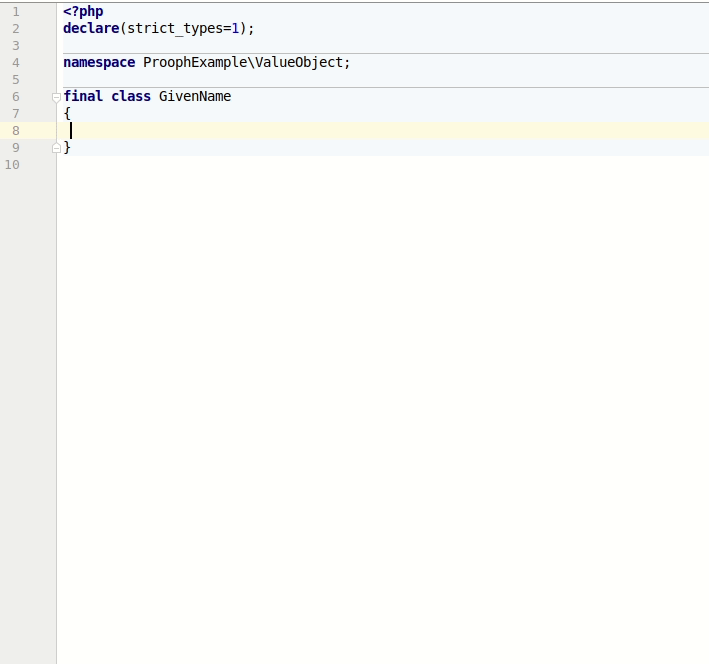
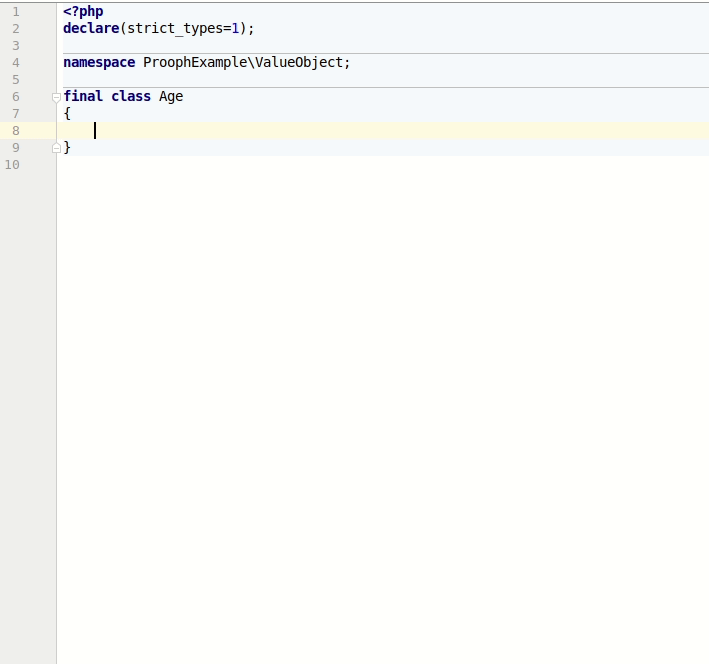
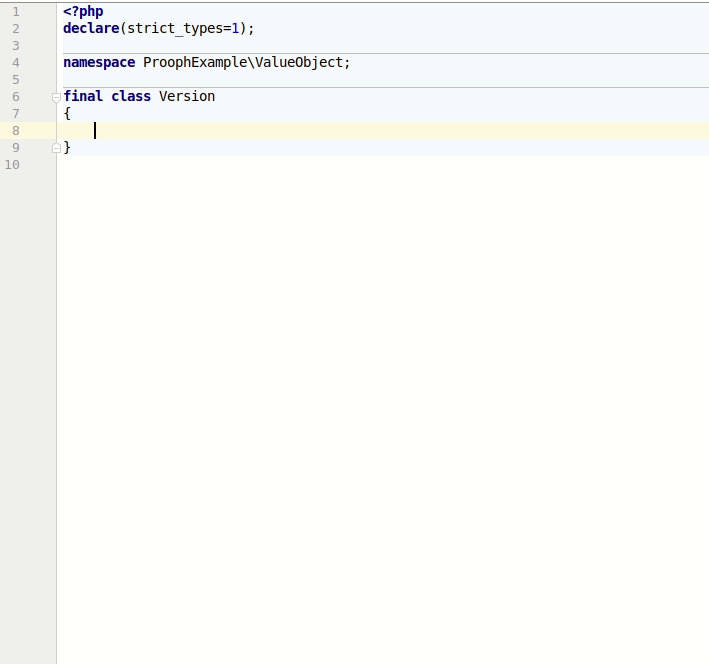
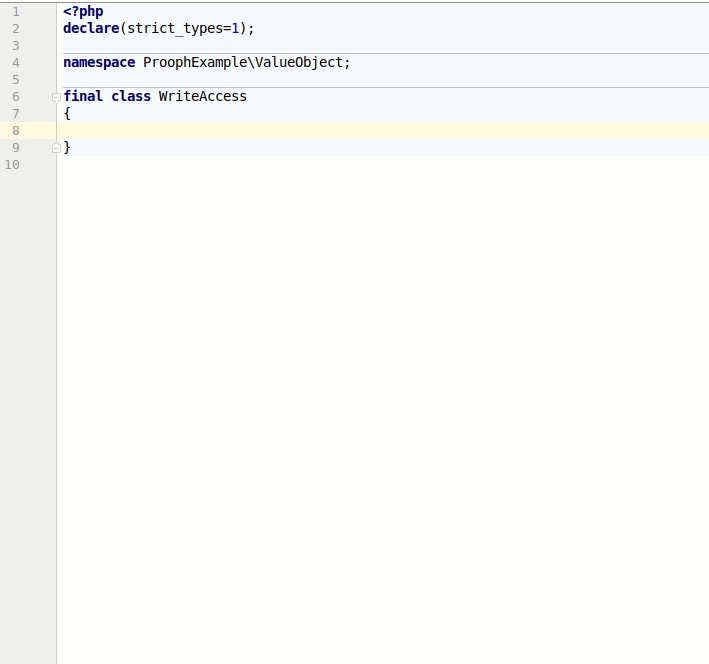
Specialized Scalar Types
vo_uuid
A UUID value object template is included, too. It works with the well known ramsey/uuid library.
Along with the vo_uuid template you also get a use_uuid template. Use them in combination like shown in the example:
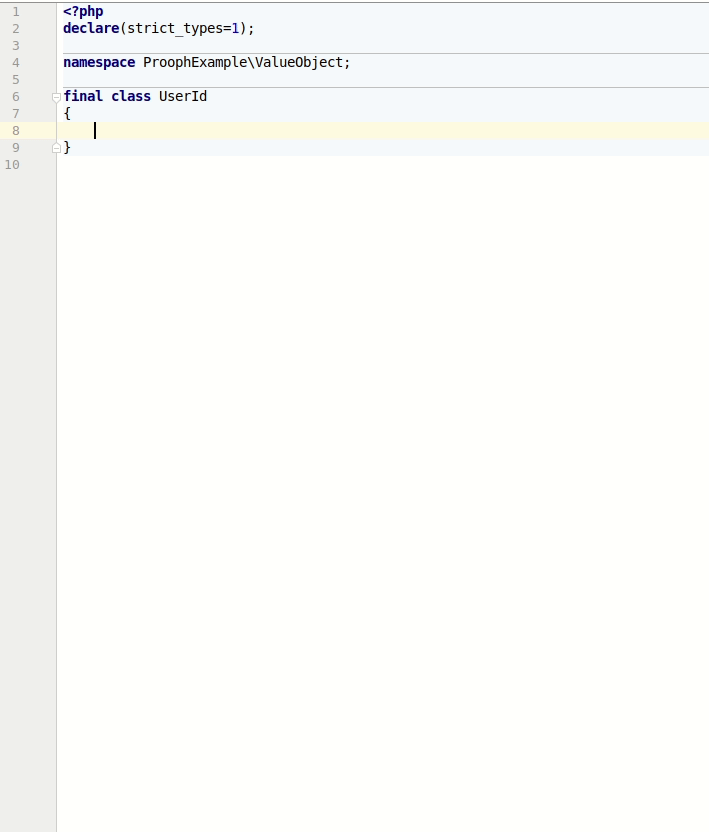
vo_datetime
The vo_datetime is another specialized scalar value object template. It uses PHP's built-in \DateTimeImmutable, ensures
UTC is used as well as a standard format for from/to string conversion.
The FORMAT constant can be used to change the format. By default it is 'Y-m-d\TH:i:s.u, which is the same format as of the Message::createdAt property.
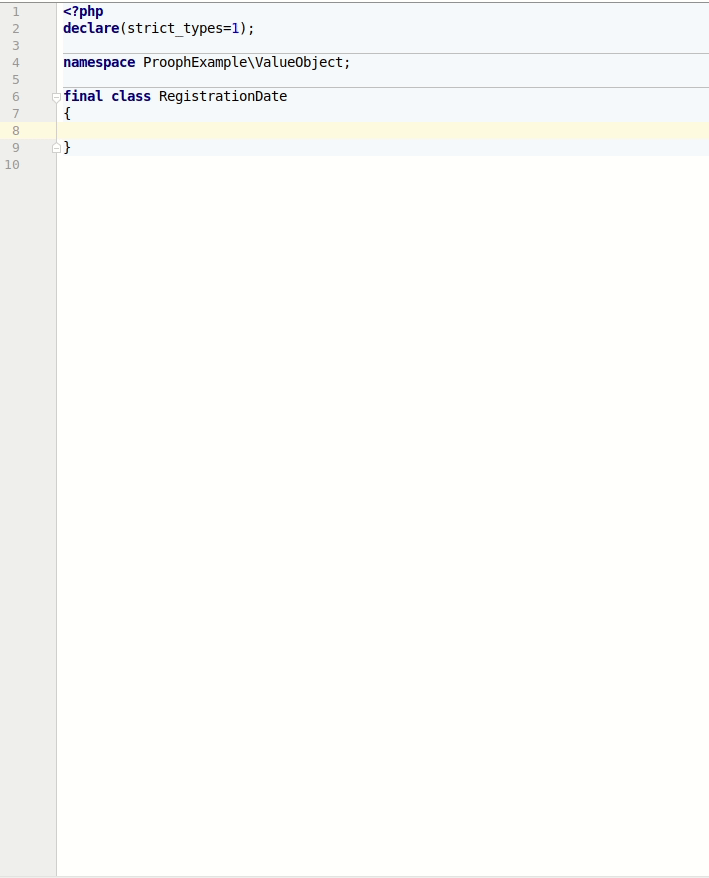
List / Collection
If you need a list or collection with all items being of the same type you can use the vo_collection template. It generates quite a lot of code so that you can work with the list
out-of-box. Feel free to add more methods, either to the template or after code generation if it is specific to the concrete class.
The template needs two information:
- The item class. The item class should at least have a
public static from<RawType>($rawType)method, apublic to<RawType>()method and apublic equals(ItemClass $other): boolmethod. Of course all immutable objects generated with our VO templates can be used as item class. - The raw type of the items, one of:
string, int, float, bool, array
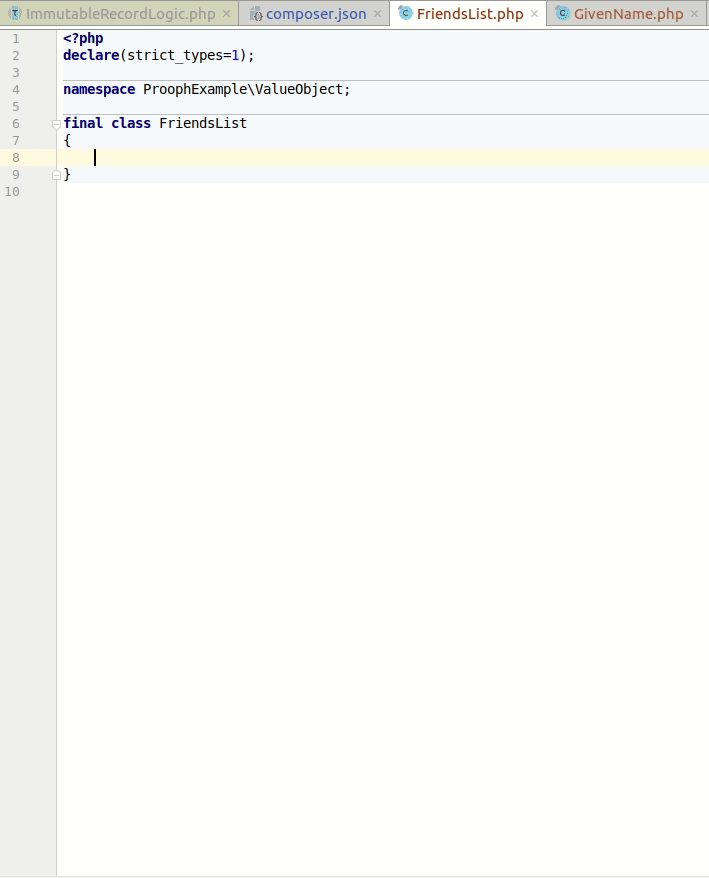
If you use the push() and pop() methods, keep in mind that the list is immutable. That said, only the returned list contains the change (item appended, last item removed).
This also means, that you have to use last() before pop() to get the last item of the list.
Complex Types
Immutable objects can have arbitrary complexity. So far we only learned about single value objects and lists. What's missing is the ability to combine them to complex objects/types.
A simple PHPStorm Live Template is not suitable for the job. Hence, EventEngine\Data provides the interface ImmutableRecord and the trait ImmutableRecordLogic to help you out.
When you use PHPStorm and import the settings.zip linked above, you have a new file template ImmutableRecord that you can choose when adding a new class to the project. The template for getter methods is also aligned. ImmutableRecord requires getter methods that exactly match with the properties they provide read access to. Hence, the get prefix is removed in the file template. The example shows both in action.
These are the steps required to get a working ImmutableRecord:
- Create a class that implements
ImmutableRecordand uses theImmutableRecordLogictrait (either use the file template or create the class by hand). - Add properties and their types. You can use the live template
record_field, which also adds a constant for each property to avoid typos. - Generate getter methods for the properties with appropriate return types. The getter methods should be named like the properties.
ImmutableRecordLogic relies on the return types of getter methods to know which property type class should be used when creating a record instance from raw data.
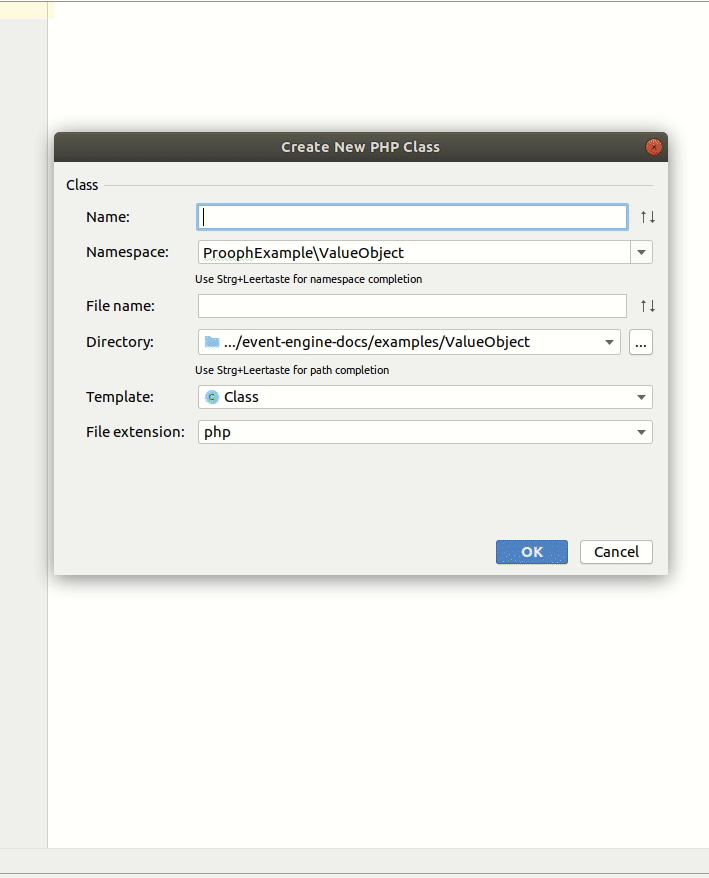
fromArray vs. fromRecordData
By default ImmutableRecordLogic provides two ways to instantiate an object:
-
fromArray(): create the record from an array containing raw data, especially useful when mapping user input or database results. -
fromRecordData(): create the record from value objects.
<?php
declare(strict_types=1);
namespace ProophExample;
use ProophExample\ValueObject\GivenName;
use ProophExample\ValueObject\Person;
use ProophExample\ValueObject\UserId;
use Ramsey\Uuid\Uuid;
$john = Person::fromArray([
Person::USER_ID => Uuid::uuid4()->toString(),
Person::NAME => 'John',
Person::AGE => 42
]);
$jane = Person::fromRecordData([
Person::USER_ID => UserId::generate(),
Person::NAME => GivenName::fromString('Jane')
]);
It is recommended to add named constructors to a record class
using the Ubiquitous Language of the domain.
Those methods can use fromRecordData() internally.
For example we could add a register() method to our Person class. The UserId is generated internally and Age is nullable and is not required by default.
<?php
declare(strict_types=1);
namespace ProophExample\ValueObject;
use EventEngine\Data\ImmutableRecord;
use EventEngine\Data\ImmutableRecordLogic;
final class Person implements ImmutableRecord
{
use ImmutableRecordLogic;
public const USER_ID = 'userId';
public const NAME = 'name';
public const AGE = 'age';
/**
* @var Age|null
*/
private $age;
/**
* @var GivenName
*/
private $name;
/**
* @var UserId
*/
private $userId;
public static function register(GivenName $givenName): self
{
return self::fromRecordData([
self::USER_ID => UserId::generate(),
self::NAME => $givenName
]);
}
/* ... getter methods */
}
Nullable Properties
ImmutableRecordLogic validates the given data. If a property (or to be more precise the return type of the corresponding getter method) is not marked as nullable, then it throws an exception. Property data validation is delegated to the property type classes. You don't have to replicate it.
Array Properties
It's recommended to use the vo_collection live template (see above) to generate lists/collections as immutable types. Such a type class can then be used for a record property.
However, in some cases you might want to use a plain php array instead of an extra class to keep a list of items in a record property. In that case you have to add a private static arrayPropItemTypeMap(): array method,
that returns a mapping of property name to type class. PHP does not provide a way to specify array item types in return types (yet). Hence, ImmutableRecordLogic needs a hint.
Let's look at an example. We a add a friends property to our Person record, define array as property/return type and provide a mapping that friends are also of type Person.
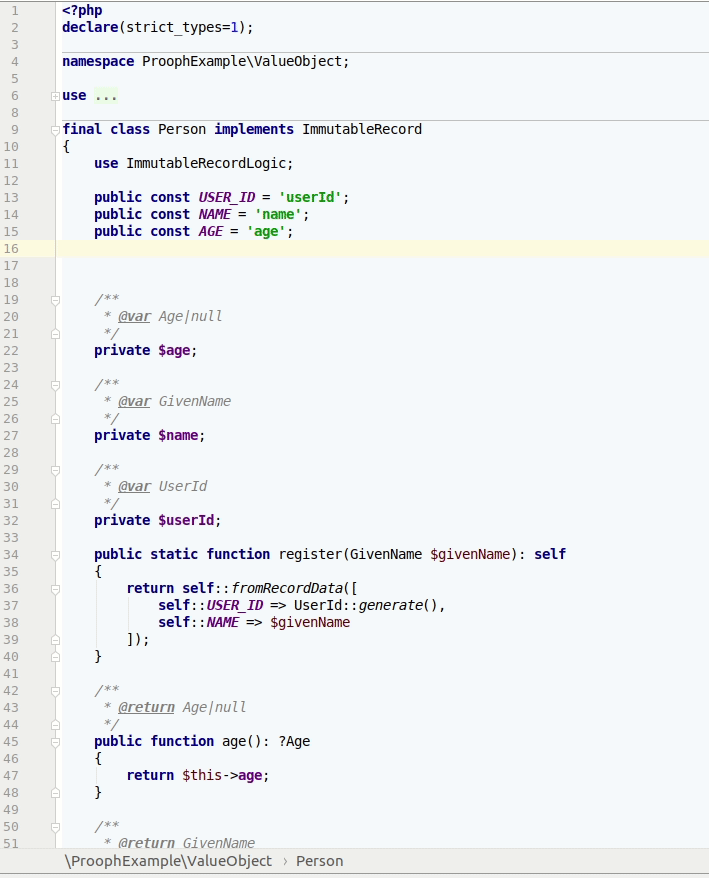
Initialize Properties
If we replace the plain array type of the previous example with the FriendsList generated earlier, our Person class would look like this:
<?php
declare(strict_types=1);
namespace ProophExample\ValueObject;
use EventEngine\Data\ImmutableRecord;
use EventEngine\Data\ImmutableRecordLogic;
final class Person implements ImmutableRecord
{
use ImmutableRecordLogic;
public const USER_ID = 'userId';
public const NAME = 'name';
public const AGE = 'age';
public const FRIENDS = 'friends';
/**
* @var FriendsList
*/
private $friends;
/**
* @var Age|null
*/
private $age;
/**
* @var GivenName
*/
private $name;
/**
* @var UserId
*/
private $userId;
public static function register(GivenName $givenName): self
{
return self::fromRecordData([
self::USER_ID => UserId::generate(),
self::NAME => $givenName
]);
}
/**
* @return FriendsList
*/
public function friends(): FriendsList
{
return $this->friends;
}
/* ... other getter methods */
}
Again: no extra mapping required! Try to favor collection classes over plain arrays!
When a new person registers for our service their friends list would be empty. Hence, we don't want to require that property in the register() named constructor.
On the other hand we also don't want to make the friendsList property nullable. Iterating over an empty list results in no iteration at all. No need to check against null first.
To solve the conflict we can override the empty init() method of ImmutableRecordLogic. The method is called after all properties have been set, but before the null check is performed
(which would result in an exception for the current Person::register() implementation).
<?php
declare(strict_types=1);
namespace ProophExample\ValueObject;
use EventEngine\Data\ImmutableRecord;
use EventEngine\Data\ImmutableRecordLogic;
final class Person implements ImmutableRecord
{
use ImmutableRecordLogic;
public const USER_ID = 'userId';
public const NAME = 'name';
public const AGE = 'age';
public const FRIENDS = 'friends';
/**
* @var FriendsList
*/
private $friends;
/**
* @var Age|null
*/
private $age;
/**
* @var GivenName
*/
private $name;
/**
* @var UserId
*/
private $userId;
public static function register(GivenName $givenName): self
{
return self::fromRecordData([
self::USER_ID => UserId::generate(),
self::NAME => $givenName
]);
}
private function init(): void
{
if(null === $this->friends) {
$this->friends = FriendsList::emptyList();
}
}
/* ... getter methods */
}
Never override __construct() of ImmutableRecodLogic!
Always use the init() hook for setting default values.